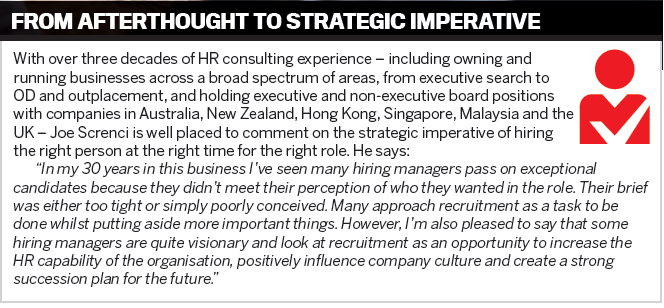HRD explores the still-vital role played by the job interview in the digital age – and provides some tips on how to do it better

HRD explores the still-vital role played by the job interview in the digital age – and provides some tips on how to do it better
Few would argue that talent acquisition is one area of HR’s mandate that has changed almost beyond recognition in the past decade. Thanks to technology breakthroughs, these changes have naturally focused on the tools of the trade, in terms of how talent is identifi ed, funnelled and onboarded.
The advent of LinkedIn, for example, has revolutionised how talent is identifi ed. Years ago, the options available to organisations when looking for talent were to source internally, advertise (print or online), make direct contact with referred candidates, or use a recruitment or executive search firm to access a broader base of candidates. When considering a recruitment or search firm to work with, their industry expertise, contact base and database of candidates were extremely important. Now, by using LinkedIn, recruiters can very quickly search and review updated CVs to identify and contact candidates globally. LinkedIn has created a searchable, constantly selfupdating global talent database.
Changes afoot
The changes don’t stop with the tools and platforms utilised. One experienced recruiter, Joe Screnci, chairman of JRS International Search Partners, says the job interview itself has also changed and will continue to evolve with technology, expertise and regulation. Whether interviews are conducted faceto- face or via online tools, or whether they are one-on-one or via panels, these changes must be considered during this critical phase of recruitment.
“Results should be validated using other tools and techniques to provide a meaningful insight into the candidate” - Joe Screnci, JRS
On the technology front, the proliferation of social media and also online databases has impacted how background checks are handled and what kinds of questions are asked at interviews. “I’m finding a trend that information found online is making its way into interview questions,” says Screnci.
He adds that anti-discrimination legislation has also had an impact on how interviews are handled. This development has caused interviewers to focus interview questions on experience, qualifications, skills and capability. Meanwhile, changes in corporate culture promoting diversity and equity ensure that interview questions focus on ability rather than disability.
Targeted selection off-target
One consistent element has been behavioural interviewing, also known as targeted selection, which today is used widely as a means of candidate assessment. However, Screnci says there is a fundamental flaw in this technique.
“The premise of this technique is that the best predictor as to how someone will act in a certain situation in the future is how they reacted to a similar situation in the past. This does not consider the environment they were in at the time and other infl uences; for example, economic climate, management directives, personal circumstances, company culture, etc., associated with the past situation. Many extraneous infl uences could have a ected how the person acted at the time,” he says. Without these infl uences, Screnci suggests the person may well have acted di erently. Accordingly, the predictive value of this technique is questionable if there isn’t an understanding of these infl uences. “Results should be validated using other tools and techniques to provide a meaningful insight into the candidate,” Screnci says.
.png) Mistakes to avoid
Mistakes to avoid
When asked what kinds of mistakes recruiters make during the interview process, Screnci admits “there are many”, but he highlights four in particular.
Firstly, people generally like to hire people like themselves: background, personality (commonly described as ‘culture fit’), likes/dislikes, etc. This does not always result in the right hire.
“Managers need to be more clinical about the outcomes required from someone in the role, and spend time developing interview questions designed to determine the candidate’s capability to deliver those outcomes,” Screnci says.
“This may include characteristics completely different from those of the hiring manager. The answers to the interview questions must then be validated with the results of other tools, techniques and reference checking before being accepted. Hiring managers should be open to talented candidates who think differently to them and have a different style or personality.” Secondly, it can be a problem when the interviewer asks hypothetical or pet questions that they like and use in every interview to search for a specific answer.
“This is just as bad as the ‘tick a box’ questionnaire that is process-driven rather than designed to find the best candidate,” Screnci says.
“People are all different. You can’t use a standard form to assess different people, particularly if you’re looking for initiative, innovation, agility, self-reliance, etc.”
Thirdly, some hiring managers mistakenly believe their view is more important than that of others. “Candidates will sometimes know different ways to do something that may be more effective. A non-ego-driven manager will see this as a positive rather than feeling threatened,” Screnci says.
“You can’t use a standard form to assess different people, particularly if you’re looking for initiative, innovation, agility, self-reliance, etc” - Joe Screnci, JRS
Finally, Screnci suggests recruiters should position themselves as trusted advisers. He says recruiters need to be solution-driven and assist hiring managers with expertise and direction. Their role is to ensure that the manager is provided with recruitment support and is focused on hiring candidates who can deliver the outcomes required and not simply be clones of the manager.
“Internal and external recruiters need to act as a trusted adviser, rather than ordertakers or processors,” Screnci says. “Unless you’re testing the hiring manager’s thinking and influencing the process, you’re not adding value beyond an administrator.”
Improving the process
How can the process be handled more effectively? Screnci suggests that all hiring managers should be trained in writing position descriptions from a behaviours and outcomes perspective rather than a duties and responsibilities perspective. Hiring can then be conducted to find someone who will show the required behaviours that will lead to the desired outcomes. This will also assist with performance assessment and counselling as these sessions can focus on whether the required behaviours have been exhibited.
Prior to conducting a behavioural interview, there are several key steps to follow. The interviewer should determine what outcomes are required from the role and then delineate what behaviours should be displayed to achieve those outcomes. The interviewer can then develop questions designed to elicit answers that will show whether or not the candidate exhibited these behaviours innately or acquired them through learning in the past.
The interviewer should, through deeper questioning, take care to understand the environment in which these behaviours were exhibited, and whether the candidate was instructed to behave in that manner or it was the candidate’s own initiative. “This is important as people will react differently to the same situation in different environments, personal circumstances, company cultures, management style, etc,” Screnci says. Questions should be structured in a STAR format (see box above). Candidates should be asked to describe the following:
- a Situation to assess whether they behaved in a manner that would allow them to achieve the outcomes being sought
- what Tasks they had to perform
- what Actions they took
- what Results were achieved
“Remember, candidates are skilled at this type of interviewing, so you will need to validate their answers through other interview techniques, aptitude testing, personality profiling, reference checking, etc,” says Screnci. Once interviews are conducted, an effective interviewer will assess candidates and choose the one that has the highest probability of being successful in the role and delivering the required outcomes by exhibiting the appropriate behaviours. In addition, the interviewer may also look for a candidate that can bring a particular skill set to the organisation, contribute to the success of others, be a positive influence in the development of organisational culture, and grow and contribute at a higher level in the future. No doubt different candidates will have different attributes, and the interviewer should gain a broad base of opinion and develop substantial validated information prior to deciding who to hire.
Screnci has one final warning: “Gut feel isn’t enough, and managers that rely on this are not doing the company any favours. The more validated information you gain on a candidate and the more stringent the process, the better gut feel you’ll have about the hire.”
 JRS ISP
JRS ISP
Joe Screnci is chairman of JRS International Search Partners, a senior-level executive search firm with offices and affiliates in Amsterdam, Budapest, Copenhagen, Denver, Frankfurt, Hong Kong, Johannesburg, Kuala Lumpur, London, Melbourne, Milan, Monaco, Oslo, Paris, Prague, Sydney and Vienna.









